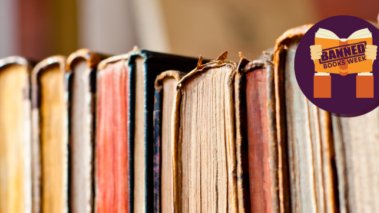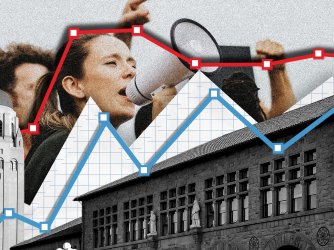Table of Contents
Banned Books Week: FIRE staffers reveal their favorite banned and challenged books

In honor of Banned Books Week, we asked FIRE staffers — civil liberties advocates and experts from a wide variety of political, ethnic, religious, and ideological backgrounds — to tell us about their favorite banned or challenged book.
What did the book mean to them? What was their favorite line? How did this book shape their life?
The responses illuminate the power of a good book — and, we hope, might just inspire the next addition to your reading list.
"The Golden Compass (His Dark Materials),” by Philip Pullman
“‘The Golden Compass’ helped me see the world in a different way. It helped me learn that being myself, and pursuing my individuality was important, regardless of what the people around me thought I should be.” — Kelsey Naughton, Data Analyst
“‘The Golden Compass’, and the remainder of the ‘His Dark Materials’ series, encouraged me to think for myself, become more introspective, and become more willing to challenge myself. The series also happens to be a fantastic read.” — Brynne Madway, Staff Attorney, Stand Up For Speech Litigation Project
“The Catcher in the Rye,” by J.D. Salinger
“I can't imagine a more beautifully painful and personal novel, and I likewise can't imagine the impulse to censor something so revealing and meaningful.” — Azhar Majeed, Vice President of Policy Reform
“Lord of the Flies,” by William Golding
“‘Lord of the Flies’ was my first introduction to the power of social situations and their drastic effects on human psychology. Years later, even with a bachelor's degree in psychology, I still consider it one of the best illustrations of this concept.” — Eli Feldman, Executive Assistant to the President
"Brave New World," by Aldous Huxley
“My favorite part of ‘Brave New World’ is when the Savage rebels against the seeming utopia of the World State and exclaims to Mustapha Mond, the Resident World Controller of Western Europe, ‘But I don't want comfort. I want God, I want poetry, I want real danger, I want freedom, I want goodness. I want sin.’ The idea of there being more to life than comfort and happiness has always stuck with me.” — Tim Murphy, Digital Outreach and Alumni Development Fellow
“Where's Waldo,” by Martin Handford
“I was supposed to find Waldo, but I ended up finding myself instead.” — Daniel Burnett, Communications Manager
“Flowers for Algernon,” by Daniel Keyes
“Intelligence is a curse and children should learn that as early as possible. Also that most of the things you try to accomplish will turn out to be awful. Every cure is a disease we don't fully understand. If you don't think people are laughing at you, you're probably just too dumb to realize it. I guess it's really just full of important lessons for kids.” — (The always uncensored) Adam Goldstein, Justice Robert H. Jackson Legal Fellow
“To Kill a Mockingbird”, by Harper Lee
“It’s cliche, perhaps, for lawyers to cite ‘To Kill a Mockingbird’ as one of their formative books, but it’s nevertheless been on my mind throughout my 14 years at FIRE. When you work to promote free speech and due process, which often involves defending those who are unpopular, it’s hugely useful as a reminder of why avoiding prejudice, no matter the temptation, is so critical to our system of laws.” — Robert Shibley, Executive Director
“Howl and Other Poems,” by Allen Ginsberg
“‘Howl’ is wonderful and rhythmic, like reading music, and learning about its associated obscenity trial got me interested in expression and the law.” — Laura Beltz, Program Officer, Policy Reform
“‘The Giver’ was my favorite book throughout my childhood. It is a devastating critique of conformity and the choice of comfort over truth. Come to think of it, I bet many of my views on freedom of expression that led me to FIRE were molded early on by ‘The Giver.’” — Ryne Weiss, Assistant to the Executive Director
“‘The Giver,’ for me, was about more than all the big ideas I encountered in the story itself. It was about being eight and reading a book, and for the first time ever, feeling like a completely different person when I was done.” — Alex Morey, Editor-in-Chief, Newsdesk
“A Clockwork Orange,” by Anthony Burgess
“‘A Clockwork Orange’ made me realize the folly and arrogance of sanitizing literature of objectionable content.” — Zach Greenberg, Justice Robert H. Jackson Legal Fellow
“The Lord of the Rings,” by J. R. R. Tolkien
“Apparently people burned copies of ‘The Lord of the Rings’ because it contained ‘Satanism.’ I don't think we read the same edition.” — Sarah McLaughlin, Senior Program Officer, Individual Rights Defense Program and Social Media Manager
“Where The Wild Things Are,” by Maurice Sendak
“What I love about Sendak’s work is that he understands the value of confronting monsters rather than running away from them. Max stared down the wild things ‘without blinking once. And they were frightened and called him the most wild thing of all and made him king of all wild things.’ Even children can learn that often what seems most distressing can be overcome. It's something we need to remind ourselves of throughout our lives. Especially in college.” — Pamela Paresky, Chief Research Officer to the President and CEO
“The Rabbits' Wedding,” by Gareth Williams
“Children's book published in 1958: Two bunnies fall in love and get married. One is white; the other is black. It's a beautifully illustrated and lovely children's book.” — Cynthia Meyersburg, Research Fellow in Psychology
“The Things They Carried,” by Tim O’Brien
“When I first read ‘The Things They Carried’ in high school, the stories introduced me to the rawest narratives of war that I had ever come across. The work shaped the way I view military conflict and the various ways it impacts those who return from it. There's no denying that the stories can be gruesome, but that's what is so important about this work — it doesn't merely detail valor and triumph, but illustrates the painful experiences that can be immensely difficult to confront and are oftentimes intentionally buried.” — Theresa Glinski, Program Officer, Campus Outreach
“The Kite Runner,” by Khaled Hosseini
“This book was banned from my high school curriculum because a parent complained about the rape scene depicted — not the rape scene itself, but the fact that it was a gay rape scene.” — Zoe Kuenstler, Development Officer
"The Glass Castle," by Jeannette Walls
“‘The Glass Castle’ is probably the most powerful memoir I've ever read.” — Samantha Harris, Vice President of Policy Research
“‘Lolita’ is like an onion. It has many layers to peel back. Censors who never dive beneath the surface miss the parts most worth chewing over.” — Nico Perrino, Director of Communications
“A Farewell to Arms,” by Ernest Hemingway
“The book is good. When I found out people had tried to ban it, it made me feel bad. I wouldn't trust Scribner's Magazine in 1929 to decide what books I should read. That doesn't seem right or true to me. It seems like a damned shame for someone to try to ban a book.” — Bill Rickards, Communications Coordinator; Production Editor, Newsdesk
“The Giving Tree,” by Shel Silverstein
“‘The Giving Tree’ works on multiple levels: It’s a didactic fable that teaches children to be grateful and think of their impact on others, but like a lot of good art, you can stare at it nine different ways and see nine different things.” — Alec Schoenfeld, Archival Fellow
“Animal Farm,” by George Orwell
“Orwell’s use of farm animals to tell the story of the Russian Revolution makes for brilliant satire. It serves as a reminder that we should always look out for the use of fear to consolidate power.” — Jackie Farmer, Program Officer, Individual Rights Defense Program
“Slaughterhouse-Five,” by Kurt Vonnegut
“This book helped shape me at a formative age. It's a cynical critique on everything about the human experience, full of powerful and bizarre stories ranging from World War II firebombing to alien abductions. ‘And Lot's wife, of course, was told not to look back where all those people and their homes had been. But she did look back, and I love her for that, because it was so human. So she was turned into a pillar of salt. So it goes.’” — Aaron Reese, Video Editor and Production Associate
To learn more about the history of some of the most frequently banned and challenged books in America, head over to FIRE’s new Banned and Challenged Books page in our First Amendment Library.
Recent Articles
FIRE’s award-winning Newsdesk covers the free speech news you need to stay informed.

A third of Stanford students say using violence to silence speech can be acceptable

Stanford president and provost cheer free expression in open letter to incoming class

FIRE survey shows Judge Duncan shoutdown had ‘chilling effect’ on Stanford students
